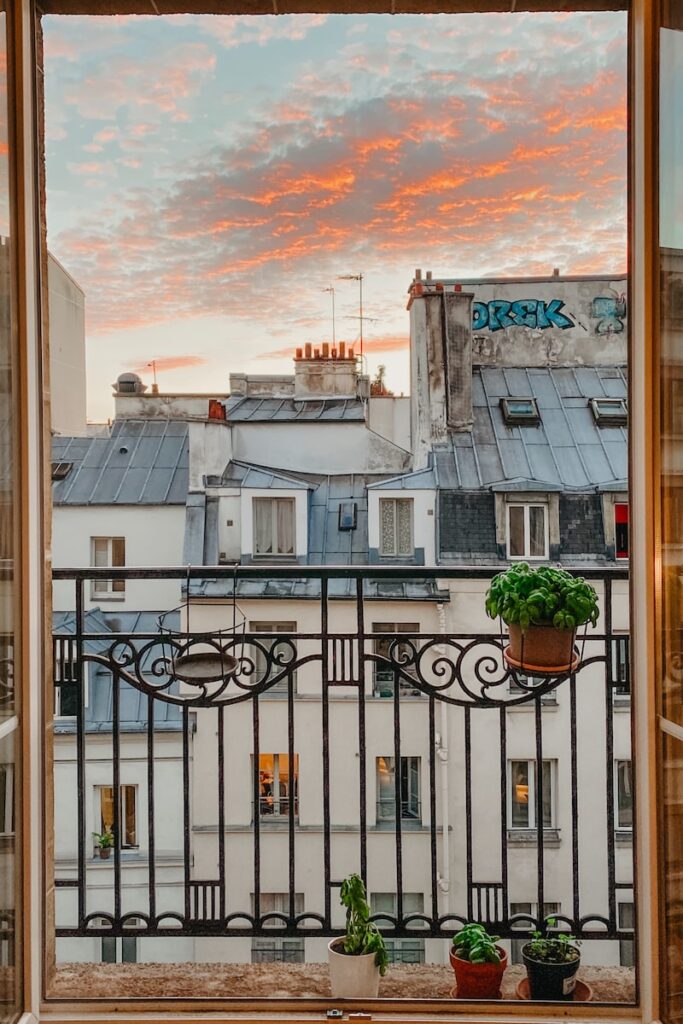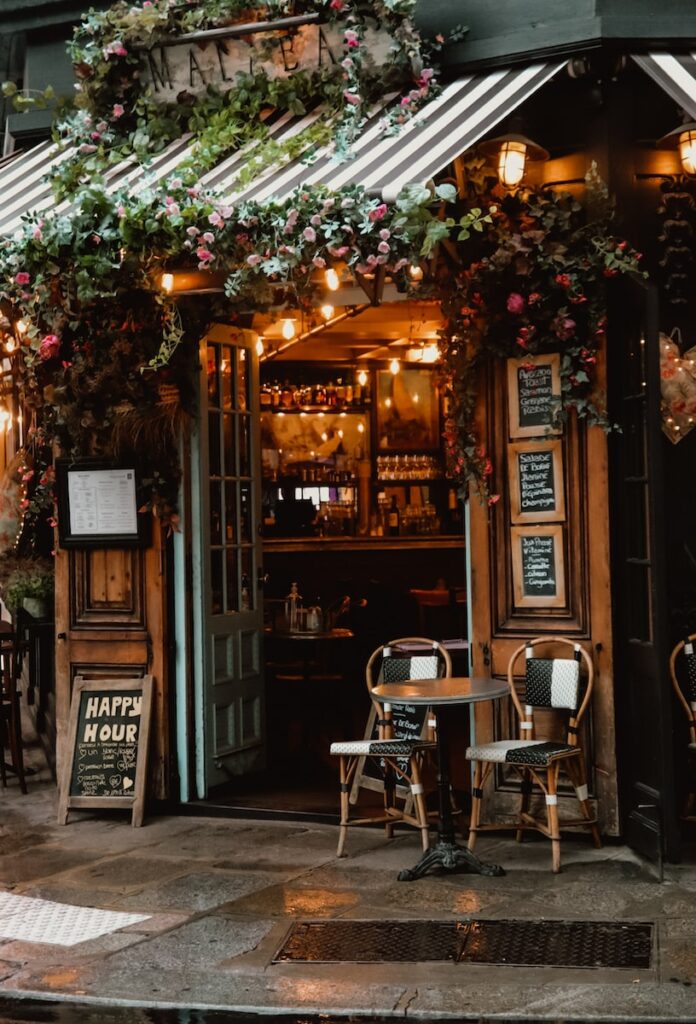Steps to finding your perfect apartment in Paris
Indulging in perfectly flaky croissants for breakfast, sipping glasses of wine alfresco at lunchtime, and enjoying daily walks along the River Seine, life in Paris sounds all too tempting. However, before your daydreaming starts getting out of hand, there are a few practicalities you’ll need to organize ahead of moving to the City of Love… like figuring out how to find an apartment in Paris.
No matter whether you’re frequenting the city for a week, a month, or planning to stay for the long term, the first thing on the to-do list is to find your home away from home in the big city. Searching for accommodation in a new city or even a new country can be somewhat overwhelming. However, with our seven-step process, we hope to debunk those fears and get you on the fast track to Parisian life.
Here are our two pennies on how to find accommodation in Paris.
Step 1: Find neighborhoods where you’d like to live
Choosing the right neighborhood to settle down in Paris can make or break your experience in a city, which is why prior research is an absolute must. One of Europe’s most desired cities, the sprawling city of Paris has an impressive 20 neighborhoods to choose from, all of which spiral out from the center and are known more locally as arrondissements.
Every district offers a unique glimpse into Parisian life, with its different perks and pitfalls regarding rental prices, proximity to the city center, amount of green spaces, quality of life, and ambiance. Before you start researching the best neighborhood to live in Paris, why not take a few minutes to consider things like:
- Budget – how much are you willing to spend each month?
- Commute – how far are you happy to travel to work each day?
- Green space – how important is having a park nearby?
- Schools – do you need a nearby school for your children?
- Local community – are you looking for young and lively or quiet and more family oriented?
- Transport – do you need access to parking, or are you happy using public transportation?
Once you’ve decided on your must-haves in the local area, it’s time to start thinking about potential neighborhoods. Here are just a few of our top picks, but for more information, you can check out our complete guide to the best neighborhood in Paris.

- 16th Arrondissement - Passy
Passy is perfect for families or those who prefer quieter suburban life. It is known for its peaceful streets, close-knit communities, and many green spaces, including the city’s largest park – Bois de Boulogne. While Passy is one of the more expensive neighborhoods to live in Paris, many families are happy to pay the price thanks to its highly-regarded international schools.
- 11th Arrondissement - Bastille
Pandering to those on a budget, the neighborhood of Bastille has long been considered one of Paris’ more affordable places to live. It stretches along the eastern banks of the River Seine, offering a mix of traditional stone housing along with modern condos. Currently experiencing a period of gentrification, you’ll find quaint bakeries, local bars, and fabulous French eateries on every corner.
- 5th Arrondissement - Latin Quarter
Students and young professionals tend to gravitate towards the Latin Quarter due to its many budget-friendly eateries, lively nightlife, and charming accommodation choices. Close enough to the city center but still a complete neighborhood in itself, the Latin Quarter offers a vibrant social life and convenience to all of the city’s top sights.
- 4th Arrondissement - Le Marais
If you’re only in Paris for a short while, then it pays to be at the center of the action, and that’s exactly what Le Marais offers. With the River Seine visible from every corner, the Louvre a quick walk away, and a 24-hour social scene, Le Marais lies at the heart of the city. Rental prices aren’t the most affordable here, but you’re bound to save on transport by being within walking distance of almost everything.
- 20th Arrondissement - Menilmontant
What began as a small hamlet just outside the borders of Paris quickly became one of the city’s hippest arrondissements. Starting from humble beginnings, the neighborhood has quickly grown into an affordable area with a vibrant atmosphere to complement it. Here, you’ll never struggle to find the latest hole-in-the-wall eatery, the newest bar, or some of the city’s best croissants.
Step 2: Figure out what type of rental you need
Okay, so you’ve found your ideal neighborhood in Paris; what’s next? Now, it’s time to start thinking about how to find an apartment in Paris that suits your exact needs. You’ll find a whole host of different options scattered around the city and its arrondissements, from fully-serviced apartments with everything included to unfurnished apartments that you can really put your stamp on.
Here are a few options to consider:
- Furnished accommodation
Furnished apartments are usually a much easier option if you’re moving to Paris for the short term. Removing the hassle (and cost) of sourcing all of your furnishings, from the sofa to your bed, your kitchen table to your wardrobe, you can ensure a smoother process of moving. Unfortunately, furnished apartments aren’t prevalent in Paris, and most traditional rentals come without any furniture at all. What’s more, those apartments that come furnished tend to be on the smaller side, suited to those looking for studio or one-bedroom flats.
If you’re confident that you want furnished accommodation, then you may want to consider serviced apartments in Paris. As well as being fully furnished, most serviced apartments include the cost of utility bills, Wi-Fi, and sometimes a regular cleaning service in its monthly fee.
- Short-term rental
For those that simply want to dabble in the Parisian lifestyle for a short time, not a long time, short-term rentals are also available in the city. These are great for digital nomads hopping from one city to another, Erasmus students only studying in Paris for one term, or anyone on short-term business in the city.
As a general rule of thumb, you can secure a short-term rental in Paris for a minimum of one month up to six months, depending on the provider. You’ll find that most short-term rentals come full-furnished, and those that are serviced apartments will come with the electric, water, gas, Wi-Fi, and other bills included.
- Aparthotel
For the ultimate convenience, why not combine the convenience of a serviced apartment in Paris with the added benefits of hotel service? Designed to be a home away from home, your room will be much larger than a traditional hotel, complete with a fully-fitted kitchen, laundry facilities, and living areas. Along with independent living, hotel-esque service is an added bonus to living in an aparthotel. Many also come with a 24-hour front desk and cleaning services, and some even have on-site gyms, restaurants, and bars.
Similar to a serviced apartment, Aparthotels can be booked ahead of your stay, which means you have somewhere to call home as soon as you land in Paris. Even better, consider a more casual type of rental and often dealt with through an online booking system, you won’t need to provide a dossier as you would for other types of accommodation in Paris.
- Coliving
Finding a shared apartment in Paris is certainly one of the most budget-friendly options and a great way to meet people when you’re new to the city. Co-living is a popular option among students and young expats, with options spread across the city. Generally, flat shares are larger properties, some of which are houses, with multiple residences sharing bathroom and kitchen facilities. These can be ideal for those who are keen to meet new people but not the preferred solution for anyone who enjoys more of a private life.
While you will find some flat shares within the realms of the city center, you will be better suited to search through the city’s outer arrondissements. With more space and larger properties, flat shares are more common in the 17th, 18th, 19th, and 20th arrondissements.
- Unfurnished
Unfurnished rental properties are some of the most common types of accommodation in Paris, but they are better suited for those moving to the city for the long term. While you’ll almost certainly have a wider range of accommodation options to choose from, including modern condos, traditional stone houses, and modern new builds, much more effort goes into moving into unfurnished accommodation.
The most obvious issue is the need to source and buy all of the necessary furnishings, including your bed, sofa, TV, table, and storage. Of course, this can make the moving process slightly more costly and longer. However, it can be a much-welcomed creative process for those wishing to put their own stamp on their accommodation in Paris.

Step 3: Understand Paris property types
When it comes to figuring out how to find an apartment in Paris, part of the complete process is understanding the types of properties available for you to rent. If you’re moving to France from a different country, these types of properties might not be so familiar to you.
To help you understand the jargon you find on many estate agents websites, here’s a quick low down on the names of properties you’ll find in the city.
- Pied-à-terre. Otherwise known as an apartment, a pied-à-terre is one of the most common types of accommodation you’ll find in Paris. Generally, these are smaller studio, one-bedroom, or two-bedroom apartments found in the inner city districts.
- Newbuild. While modern apartments and houses are hard to come by in the capital, there has been an increasing number of new builds popping up in Paris in recent years. These are becoming very desirable thanks to the low maintenance and bright, airy spaces they provide.
- Detached. As space is hard to come by in the French capital, detached housing is rare. If you are after a detached property, you’ll need to start your search in the very outer realms of Paris and have a healthy budget.
- Semi-detached. Some older properties will be of the semi-detached variety. This means they are attached to another building of some sort, but just on one side. Similar to detached housing, you’ll find these in the outer arrondissements of Paris, where there is a little more space to play with.
- Batside. Usually found in the outer arrondissements in Paris, Batside is older, traditional stone properties. Generally, they are square in shape, detached from other properties, and have flat tiled roofs. You may find Batsides available as co-living spaces.
Step 4: Make a list of amenities and facilities that are important to you
Hopefully, by now, you’re slowly starting to get the jist of how to find an apartment in Paris; the search is as much about what you need as what the city can offer you. That means there’s one more step before you start using that search engine: understanding precisely what you want from the property itself.
One of the most effective ways to do this is to make three lists; one detailing the things you absolutely must have, those that you would prefer to have but can live without, and those that would be nice but a real luxury.
Here are a few amenities and facilities that you may want to consider:
- Do you want laundry facilities in the building?
- Is air conditioning necessary?
- Will you require a parking spot close by?
- How important is having an outdoor space?
- What type of security amenities would you prefer? Do you need a 24-hour front desk?
- Is having a gym onsite essential?
- How much storage space do you require?
- Does the apartment need to be pet friendly?
- Would you prefer there to be lots of activities in the local area?
- What is the Wi-Fi speed in the area? Does it cover your needs?
Of course, only some properties you find will have all the amenities you want or need. After all, accommodation in Paris is highly competitive, and you’ll need to keep an open mind to find something in time for your move. We’d recommend visiting as many properties as possible before you rule too many out.
Step 5: Browse websites to find properties online
You’ve chosen your ideal neighborhood and written down your dream apartment on paper, and now you’re ready to start the next step on how to find an apartment in Paris. Well, here comes the exciting part; the online search begins. With all of the knowledge you’ve picked up from your brainstorming sessions, you can start looking for your perfect home in Paris.
In general, finding accommodation before you move to Paris is becoming increasingly easier, especially with the advent of so many property search engines and innovative websites. In fact, just a simple Google search will provide hundreds, if not thousands, of listings of available properties in Paris.
To help get you off to a running start in your search, here are some of the most popular websites
All-rounders
- Homelike – specializing in furnished apartments, serviced apartments and aparthotels, you’ll find accommodation of all sizes on the Homelike website. Use the filtered search engine to narrow down results by rental price, amenities, and location. Even better, you can secure your apartment before you touch down in the city.
- PAP – short for Particulier à Particulier, or Person to Person, is a platform that connects you directly with local landlords and owners. It’s a good option if you’re unsure of the property market, as it allows you to ask any questions you may have. However, this is also one of the most popular websites in Paris, and properties move fast.
- Leboncoin – similar to PAP, Leboncoin promotes a mixture of rental properties and house shares, connecting you directly to your future landlord. If you’re using these types of websites, it’s better that you can visit the property as soon as one becomes available.
- Omni – this platform does things a little differently. Here, you upload your documents directly to the site and apply for individual properties. The landlord can then accept or reject your application before you go and visit the apartment.
- FUSAC – originally designed for American expats FUSAC, this rental website is written entirely in English and advertises a number of different properties, including studios, one-bedroom apartments, and two-bedroom apartments.
- Airbnb – while not always cost-effective, Airbnb can help solve your problem of how to find accommodation in Paris very quickly. Plus, you can secure your apartment before you’re in the city. Many use Airbnb as buffer accommodation while they find something a little more permanent
For flat shares and co-living
- Appartager – use this search engine to find people in your area searching for new housemates. If you find a property you like, you can message the contacts through the platform and arrange a viewing before discussing terms and conditions.
- Foyers – aimed primarily at the younger demographic and students, you’ll find larger flat shares on Foyer that tend to be in the city’s outer arrondissements.
- Facebook groups – it’s worth joining as many Facebook groups aimed at how to find an apartment in Paris as you can a few months before the move. As well as tips and trips on infiltrating the market, you’ll find adverts for spare rooms across the capital.

Step 6: Use an estate agent if all other options fail
If you’re struggling to find a suitable apartment online, the next best option is to use an estate agent on the ground. Using a site like SeLoger is a good way to familiarize yourself with neighborhoods in Paris, what you can expect to pay in each district and some of the more well-known estate agents. On this website, you’ll also be able to contact estate agents and set up a visit to the property.
The downside to finding accommodation in Paris this way is that you’ll need to be in the city to do this. Apartments move fast, and if you’re not around to visit and confirm that you want to secure the property, the estate agent will be unwilling to wait for you. Another pitfall is that you’ll need to pay the estate agent fee, which can be upwards of 300€ depending on the value and size of the property.
Step 7: Prepare your documents
No matter how you go about finding your accommodation in Paris, an absolute must is to have your dossier up to date and in working order. For flat shares and more casual types of accommodation, such as co-living, you may not need these documents. For everything else, it’s best to have your dossier in a folder that is handy at any given moment. Submitting your complete application will give you the best chance of securing accommodation and landing your dream apartment.
Generally, this is what is expected in your dossier:
- Scan of a picture ID
- French guarantor
- Last three payslips (fiches de payes) or employment contract
- Certificate of residence or recommendation letter from a previous landlord
Finding a guarantor is where a lot of people come stuck when it comes to figuring out how to find accommodation in Paris. Without any friends or family in the country, you can struggle to find someone to put their name down as your guarantor (this is someone who will pay your rent in the case you cannot). Luckily, you’ll find several online websites that can help you with this part of the process.
Simplifying the art of how to find an apartment in Paris
By now, we hope you’ve realized that with a little planning and organization, some know-how, and our top tips, finding accommodation in Paris shouldn’t be too much of a headache. While the initial thought of relocating to a new city or country can seem daunting, our six-step process breaks it down into digestible chunks that will have you living your life à la française in no time at all.
Bonne chance!






















